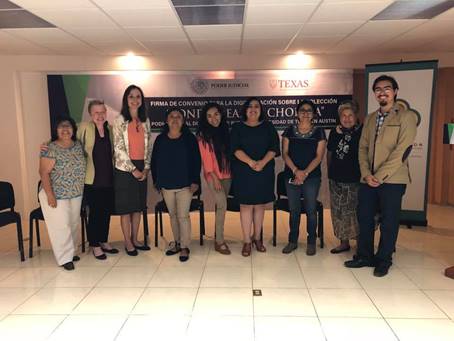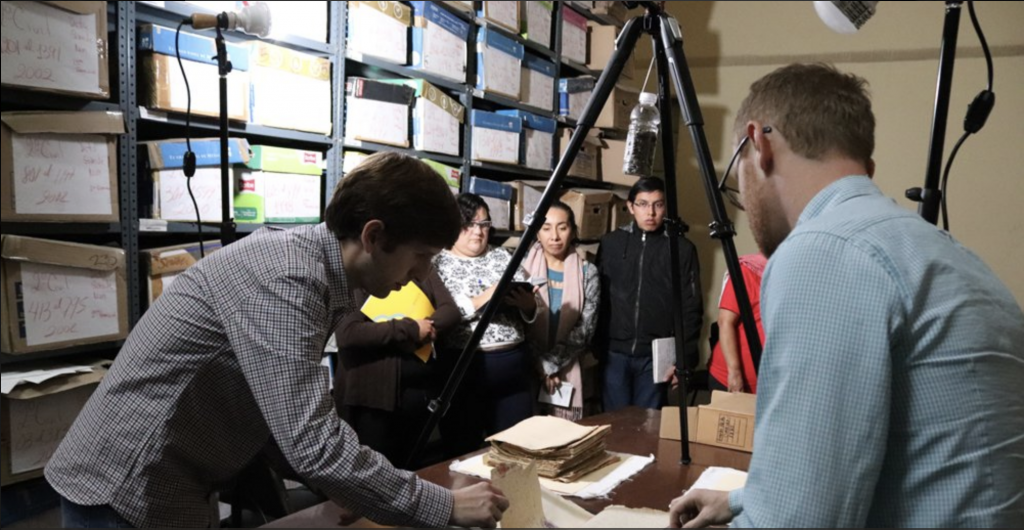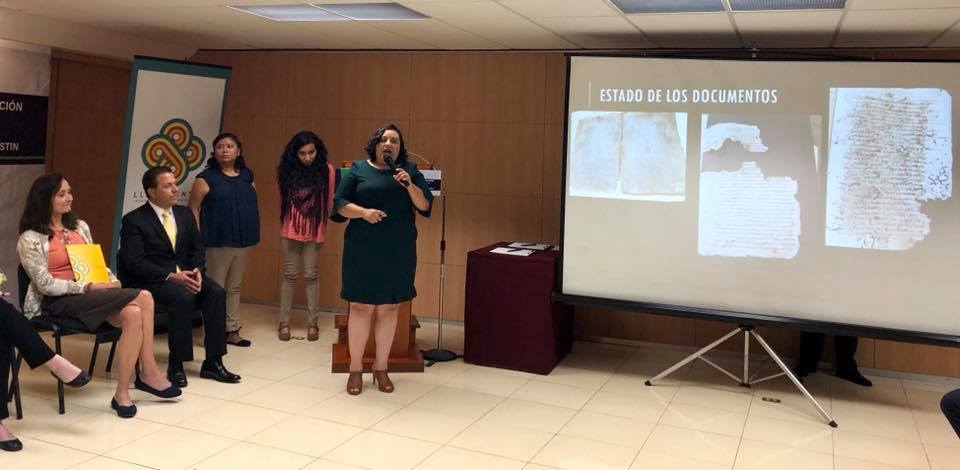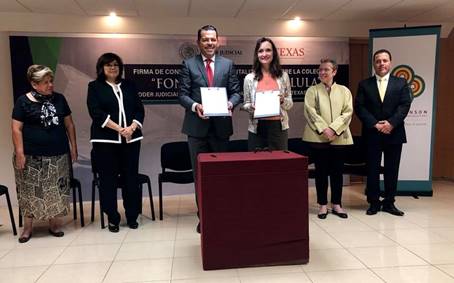Four Centuries of Rare Documents Will Be Digitized
August 8, 2018, was an auspicious day for students of Mexican history. An agreement signed between LLILAS Benson and the Tribunal Superior de Justicia del Estado de Puebla marks the official start of a project to digitize a large collection of archival materials from the Fondo Real de Cholula. Funding for the project comes from a Mellon Foundation grant obtained by LLILAS Benson.
The archives in question, which originate in the Mexican town of Cholula, Puebla State, consist of approximately 200 boxes and span some four centuries, from the 1500s to the late nineteenth century. Once digitized, they will be made available to researchers on an open-access platform by the Benson Latin American Collection and the University of Texas Libraries. The materials document, among other things, how Indigenous residents of Cholula navigated colonial judicial structures unique to their special juridical status.

A Rich Trove of Information
The materials will provide a rich trove of information about the colonial period, referred to in Mexico as la época novohispana. Cholula was one of only nine locations to be designated a ciudad de indios (in contrast, there were 21 ciudades de españoles). Ciudades de indios had a different justice system than others. Indigenous people paid their tribute directly to the king instead of to a colonial intermediary; they enjoyed certain privileges, and they maintained a fully functioning Indigenous cabildo, or council, which ruled alongside the Spanish one. “This allowed for a degree of Indigenous autonomy and exercise of special privileges in the new colonial context,” explains Professor Kelly McDonough of the UT Austin Department of Spanish and Portuguese.
LLILAS Benson might never have known about the collection in question had it not been for McDonough, who identified the collection as a good candidate for digitization. She emphasizes that the digitization of ciudad de indios documents has immense historical significance: “It’s the first time we will be able to understand what Indigenous justice meant in place with a very specific juridical designation and relationship with the king of Spain. We believe that the other eight judicial archives from ciudades de indios burned in the Mexican Revolution.”
“The chronological range of the collection will allow scholars to study how Indigenous practices adapted to Spanish rule, how new practices developed over the course of the early-modern period, and how both Indigenous and Spanish practices further adapted to modern political and legal structures in the nineteenth century,” adds LLILAS Benson digital processing archivist David Bliss.

The Digitization Process
A team of three historians from Puebla and Cholula will work in Puebla to digitize the collection, creating two digital copies—one to remain in Puebla and the other to be sent to Austin for preservation and online publication. In addition, all of the digitized materials will be extensively described using a metadata template developed by LLILAS Benson and its Puebla partners. The historians involved in the project are experts in sixteenth-through-nineteenth-century Cholula.
Dra. Lidia Gómez García of Facultad de Filosofía y Letras at Benemérita Universidad Autónoma de Puebla (BUAP) was instrumental in keeping interest in the project going amid inevitable delays. Together, she and McDonough helped choose the personnel to carry out the important work of digitization and creating of metadata for the collection. LLILAS Benson Director Virginia Garrard relates that the team working with the archives in Puebla feels a deep and personal connection with the material; the fact that they are rescuing their own patrimony from decay is immensely meaningful to them.

Last June 2018, Bliss and LLILAS Benson archivist Dylan Joy conducted a training workshop in Puebla for the digitization team. The team will carry out the project using a DSLR camera and two laptops, as well as the digital photography program Adobe Lightroom. The equipment, purchased by LLILAS Benson with Mellon grant funds, will be donated to the Puebla archive at the conclusion of the project, which is set for early May 2019. Bliss estimates that the project will digitize some 45,000 pages of documents.
The final, digitized documents will be ingested into the Latin American Digital Initiatives (LADI) platform, allowing researchers to form connections between the Fondo Real de Cholula documents and other collections on the platform.
A Groundbreaking Collaboration
Director Garrard, herself a historian, hails this project for bringing to light lesser-known historical actors. “This collaboration represents the lives and voices of groups traditionally omitted from the historical record,” she said. “The signing event highlighted the power of close and horizontal relationships between our two institutions, so clearly evident in the presentations of the young Mexican technical specialists and students who described for us their work with the documents, both as material artifacts and as historical sources.”

Quoted in Puebla’s El Popular, Héctor Sánchez Sánchez, presiding magistrate of the Tribunal Superior de Justicia, noted Puebla’s pride in the collaboration: the digitization of Fondo Real de Cholula is the first digitization project at an institution in the Mexican justice system. “Even more so for those of us who are part of this institution,” said Sánchez, “[the rescue of] this archive can achieve a change in the way we understand history.”

